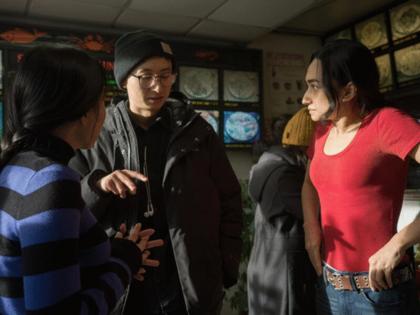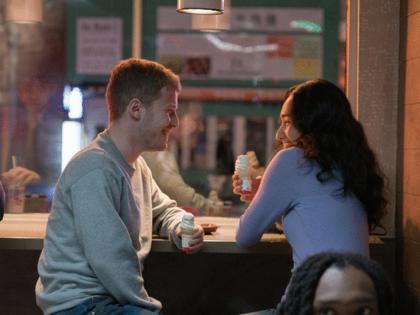How director Bing Liu found a 'unicorn' for 'Preparation for the Next Life'
Published in Entertainment News
ANAHEIM, Calif. — After filmmaker Bing Liu returned home to Chicago from a Colorado film festival in 2018, a package arrived from “Moonlight” director Barry Jenkins, who’d met Liu there and told him to stay in touch.
“He was on the jury,” Liu says of Jenkins’s role at the Mountainfilm Documentary Festival, where Liu’s debut film “Minding the Gap” won a pair of awards on its way to an eventual Academy Award nomination for best documentary feature. “He was like, you should do narrative. And eventually he sent me this book.”
The book was Atticus Lish’s 2014 novel “Preparation for the Next Life,” and as Liu turned the pages, he grew more and more excited.
Aishe is an undocumented immigrant from China’s Uyghur minority, scraping by doing off-the-books jobs in the Flushing neighborhood of Queens. Skinner is a young veteran, troubled by his wartime experiences, who sees Aishe one night and strikes up a conversation.
In their story, Liu saw the building blocks of the film adaptation of “Preparation for the Next Life,” which opens in theaters on Friday, Sept. 5.
“I was like, OK, this is amazing,” Liu says on a recent video call. “There’s a Uyghur character. Like, I feel like nobody in my life knows who the Uyghur people even are, and we get to fully explore this person.
“There’s also this other character, Skinner, where I’m like, ‘Oh my God, I grew up with people like this,” he says. “My mom was married to somebody who used to be like that as a kid; he’s the adult version of that.”
“And so I was like, ‘This is kismet.’ Like, I would love to try to tackle this.”
He traveled to Flushing, Queens, to walk the streets and neighborhoods where Aishe and Skinner fall in and out of love, and came back even more enthused.
“It’s this enclave that feels very kind of foreign,” says Liu, who was born in China before immigrating to the United States with his mother when he was 5. “When I went there, I was like, Oh, this feels more like China than America. At the time, it didn’t feel as tourist-facing; it feels a little touristy now. I was like, ‘This is amazing. It would be so great to be able to go into the sublayers of this world.”
There was really only one significant problem he could imagine: Where on earth was he going to find an actress who could speak Uyghur, Mandarin and English as the character of Aishe required?
Magic moments
“It’s kind of magical,” says Sebiye Behtiyar of how it all happened.
She was in her first year as an acting student at the Savannah College of Art and Design — she came to the United States after college in Shanghai — when a Facebook casting notice floated over the internet to campus on the coast of Georgia.
“I wasn’t prepared to have an opportunity like this at all,” she says. “But one of my actor friends sent me this casting call, like, randomly. She knows my background and said, ‘OK, I know you can speak Uyghur, right?’
“I was like, ‘What are you talking about?’” Behtiyar says on a recent video call. “And I saw this casting call, and they’re literally requiring someone who speaks all those three languages that I can speak.
“I was in shock. I was like, ‘Why would there be a film that the lead actor can speak my mother tongue? And with this kind of curiosity, I submitted my first self-tape and everything just went really smooth.”
As she waited for a reply, self-doubt crept in, Behtiyar says. But as the process unfolded — meetings with producers, with Liu, with actor Fred Hechinger who was up for the role of Skinner — her confidence grew.
“This brought me lots of strength and encouraged me that, OK, maybe I can take this role,” she says.
For Liu, Behtiyar’s audition tape was an answered prayer.
“I was so nervous in developing this for years, and then we get to a place where it’s greenlit,” he says. “Now it’s like, ‘How do we find this unicorn of a role?’”
Casting director Jennifer Venditti had a strong track record for finding discoveries in her casting nets, Liu says, and she proved it here again.
“Sebiye was the first tape she sent us,” he says. “It was almost disorienting. I was like, ‘Wait, what is this? You just found it.’”
Venditti went on to send other audition tapes too, but there was something in Behtiyar that none of the others equaled, Liu says.
“From the first tape she sent in, we saw what you’re describing, this kind of mesmerizing, magnetic thing about what’s going on in her face,” he says. “She allows you in. Even when she’s trying to cover it up, you see what’s inside.
“The metaphor that I compare her to is like she is this very powerful river that is going to just keep flowing. Working with her was just like directing this force of water. It was so, so amazing.”
Duty to the truth
After Aishe and Skinner meet in “Preparation for the Next Life,” a friendship becomes a love story, though it’s far outside the ordinary outlines of movie romances.
Because of Aishe’s status as an undocumented immigrant, her life is a grind. She rents a small room in a crowded apartment packed with other women like her. She works long, grueling shifts in Chinese restaurants where unscrupulous owners pay less than minimum wage.
The threat of immigration officers is ever-present. [The novel and the film were written and made well before the current federal immigration policies were enacted.]
Skinner drifts through his post-Army life, living off his discharge pay with no idea what comes after the money is gone. While Aishe works, he drinks in a dive bar. Eventually, he rents a one-room apartment where she stays with him until his demons rise as his medications dwindle and he lashes out at her.
For Liu, it felt like parts of the life he’d lived at times growing up in Alabama, Los Angeles, and Rockford, Illinois. Like Aishe, his mother was an undocumented immigrant supporting herself and her son with jobs in Chinese restaurants.
“One day, this customer of hers followed her home and asked her on a date,” he says. “He asked her to marry him, which would have given us our citizenship, and she said yes. It ended up being a very tumultuous 20-year marriage. Went to a very dark place, but at the beginning was this really hopeful thing.
“She was this person in a strange country who had this guy who wanted to build a life with her,” Liu says. “Part of the reason I think I was so drawn to this book was that it was like, well, what if my mom saw this and saw herself in this character? And was like, ‘This is what it would have maybe looked like to walk away from that relationship early on.’”
His mother and stepfather had a son together, but the marriage was troubled for most of its 20 or so years, Liu says. His stepfather died as his mother’s divorce filing made its way through the courts.
The love story between Aishe and Skinner, sometimes sweet and loving, at other points harsh and cold, also felt close to home, Liu says.
“I have a very special experience in my life, both as somebody who grew up in a house with violence and in a city where there were a lot of examples of darker relationships,” he says. “Being a skateboarder, who’s always out in the streets, you know, urine-stained alleys, and you see a lot of things, couples fighting.
“It’s easy to brush people off and go, ‘Oh, look, they’re crazy, I’m glad I’m not like them,’” Liu says. “But everybody has a story, you know, and I feel like if nobody else is going to try to tell those stories, like, somebody has to. So I just feel it’s almost like my duty to tell the truth I know and not kind of repeat things just for entertainment’s sake.”
Instant chemistry
Hechinger, who plays Skinner in the film, is a more experienced actor than Behtiyar, with roles in “Thelma,” “Nickel Boys,” and “The White Lotus” on his resume.
Even so, there was no guarantee he’d get the part — and he really wanted it, he says on the same video call with Behtiyar.
“Bing’s first film, ‘Minding the Gap,’ means a lot to me,” Hechinger says. “I see a lot of movies, but it’s a uniquely beautiful movie to me that does more than just being a great movie. It actually changed how I could think about life and these cycles of violence, and it felt not only like a beautiful piece of art, but also a practical, beneficial work that really stuck with me.”
He says he also had read and loved Lish’s novels, but most of all, it was the character in the adaptation by Martyna Majok, a Pulitzer Prize-winning playwright, that spoke to him most.
“At the core of all this stuff, there’s just a feeling in your gut when you feel that you know some secret about the character that you want to play, and you just have a weird premonition that if you played this person, you would be able to really discover something.”
Like Liu, Hechinger was wowed by Behtiyar from the moment he first met her.
“I’ll never forget the day I met Sebiye,” he says. “I’m so grateful to that friend — the whole world is grateful to the friend — that sent you the Facebook link to this.”
Their chemistry read quickly established their connection, both say.
“It’s not only a bit nervous,” Behtiyar says, laughing, in response to a question about her nerves going into it. “I was nervous all the time. I still remember the first time when I saw Fred. It was just like, ‘Wow, it feels so easy to talk to him,’ and everything just makes sense at the moment. So I was like, ‘Yeah, probably he will be my coworker.’”
Hechinger says Behtiyar felt like an experienced professional from the first lines they read together.
“I remember so vividly our first minute of conversation and just a feeling of focus and truth and openness and honesty that was coming from Sebiye,” he says. “She didn’t feel like a newcomer at all, so it’s funny hearing about the nerves. To me, you seemed so sure-footed and confident, and in that way, I felt she was already becoming Aishe.”
After asking Behtiyar if he could share a story from the chemistry read, Hechinger describes just how confident she’d seemed during that later stage of the audition process.
“I remember we did some scenes and then Sebiye did this really awesome and confident thing where you said, ‘Hey, can we take a walk to talk to each other better?’” Hechinger says. “I don’t know how familiar everyone is with normal chemistry reads, not that normal matters, but that’s something that had never happened before with me.
“An audition, where in the middle, as actors, we look at the people that are trying to cast us and say, ‘You know what? Is it OK if we’re gonna leave a little bit and then come back?’
“I was like, that’s so cool and so great. So then we took a walk around those blocks and had already, I felt, begun the work of acting as these people,” Hechinger says. “But also in that walk, I just got to begin to know what a great person and artist Sebiye is.”
©2025 MediaNews Group, Inc. Visit ocregister.com. Distributed by Tribune Content Agency, LLC.
















Comments